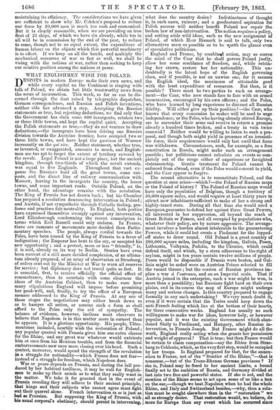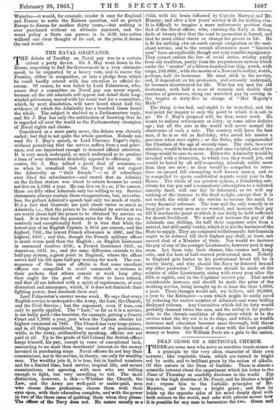WHITENGLISHMEN WISH FOR POLAND. D ESPOTS in modem Europe make their
own news, and while every capital on the Continent is ringing with talk of Poland, we obtain but little trustworthy news from the scene of insurrection. This week, so far as can be dis- cerned through the dust raised by telegraphic dispatches, German correspondence, and Russian and Polish inventions, neither side has advanced a step. Accepting the Russian statements as true, but rejecting deductions, we find only that the Government has slain some 600 insurgents, retaken two or three little towns, and kept the capital quiet. Accepting the Polish statements as true,—they do not venture to draw deductions,—the insurgents have been driving one Russian division towards the Austrian frontier, have occupied two or three little towns, and have kept the garrison of Warsaw incessantly on the qui vive. Neither statement, whether true, or invented, or exaggerated, amounts to much, and English- men are too apt to forget the extent of territory covered by the revolt. Legal Poland is not a large place, but the ancient kingdom, through two-thirds of which the revolt extends, was equal to five Englands. Throughout that vast ex- panse the Russians hold all the great towns, some out- posts, and the direct line of railway communication with Moscow, leaving to the insurgents the country, the lesser towns, and some important roads. Outside Poland, on the other hand, the advantage remains with the revolution. The King of Prussia has not drawn back ; but his Chamber has prepared a resolution denouncing intervention in Poland ; and Austria, if not sympathetic through Catholic feeling, pro- fesses and practises fair neutrality. In England, both parties have expressed themselves strongly against any intervention, Lord Ellenborough condemning the recent conscription in terms which Earl Russell could only endorse. In France, there are rumours of movements more decided than Parlia- mentary speeches. The people, always cordial towards the Poles, have been roused by the King of Prussia to a fever of indignation; the Emperor has bent to the cry, or accepted his new opportunity ; and a protest, more or less " friendly," is, it is said, already on its way to Berlin. Stories have even been current of a still more decided complexion, of an ultima- tum already prepared, of an army of observation at Strasburg, of orders sent out by the Minister at War to warn all reserves for service ; but diplomacy does not travel quite so fast. It is- essential, first, to receive officially the official effect of remonstrance, then to ascertain with some clearness the ideas of the Austrian Cabinet, then to make sure how many stipulations England will impose before promising her good-will, and, finally, to try the effect of a European menace addressed to the King of Prussia. At any one of these stages the negotiations may either break down so as to hamper all action, or assume such a form as shall afford to the Poles only the aid of sympathy. The balance of evidence, however, inclines most observers to believe that Napoleon is in this matter more in earnest than he appears. It is a glorious opportunity. His people, Ultra- montanes included, heartily wish the restoration of Poland ; any popular quarrel with Prussia gives him one extra chance for the Rhine, and any great war whatever would extricate him at once from his Mexican trouble, and from the financial embarrassments now once more closing over his head. Such a contest, moreover, would spend the strength of the revolution in a struggle for nationality—which France does not fear— instead of a struggle for freedom, which Napoleon does. War or peace depends on Prussia, and during the lull pro- duced by her habitual tardiness, it may be well for English- men to make up their minds as to what they really want in the matter. We take it for granted that in the event of Prussia receding they will adhere to their ancient principle, that kings and their subjects who cannot agree must fight out their quarrel alone. French intervention in se is just as had as Prussian. But supposing the King of Prussia, with his usual corporal's obstinacy, should persist in intervening, what does the country desire ? Indistinctness of thought is, in such cases, ruinous ; and a goodnatured aspiration for Polish success will neither benefit Poland nor repair the broken law of non-intervention. The nation requires a policy, and setting aside wild ideas, such as the new assignment of Poland, of which Herr Bismark is said to talk, only two alternatives seem so possible as to be worth the glance even of speculative politicians.
England and France, by combined action, may so coerce the mind of the Czar that he shall govern Poland justly, allow her some semblance of freedom, and, while retain- ing her crown, restore her her nationality. This un- doubtedly is the latent hope of the English governing class, and if possible, is not an unwise one, for it secures the English ideal, the maximum of attainable good with the least expenditure of resources. But then, is it possible ? There must be two parties to such an arrange- ment—the Czar, who now stands face to face with an armed insurrection, encouraged by his own officers ; and the Poles, who have learned by long experience to distrust all Russian fidelity. Will either give up their position ?—the Czar, who knows that every concession he makes will be used to urge independence; or the Poles, who having already stirred Europe, are to surrender their arms and receive in return a promise already a hundred times broken, and a treaty in vain twice renewed ? Neither would be willing to listen to such a pro- posal, and though both might yield in presence of an irresisti- ble force, their acquiescence would only last until that force was withdrawn. Circumstances, such, for example, as a free constitution in Russia, might make such an arrangement possible ; but politicians cannot calculate on events so com- pletely out of the range either of experience or farsighted statesmanship. Gentle treatment for Poland cannot be enforced from abroad, even if the Poles would consent to yield, and the Czar appear to forgive.
The second alternative is to reconstitute Poland, and the question at once arises—which ?—the Poland of Russian maps or the Poland of history ? The Poland of Russian maps would have only the population of Belgium, though a territory of 50,000 square miles, and would require at least thirty years to attract new inhabitants sufficient to make of her a strong and highly-taxed state. During all that time she would need a European guarantee to defend her against three Groat Powers, all interested in her suppression, all beyond the reach of Great Britain or France, and all occupied by populations who, whatever their policy, are by nature aggressive. The arrange- ment involves a burden almost intolerable to the guaranteeing Powers, while it could but create a Piedmont for the lopped- off states to draw round. Old Poland is a great country of 280,000 square miles, including the kingdom, Galicia, Posen, Lithuania, Volhynia, Podolia, to the Ukraine, which could defend itself, and which, by a stern adherence to the right of asylum, might in ten years contain twelve millions of people. Posen would be disposable if Prussia were beaten, and Gal- Rein might be ceded were an Austrian Prince selected to fill the vacant throne ; but the cession of Russian provinces im- plies a war d outranee, and on an Imperial scale. That if Austria joined in the enterprise, such a war might be won, is more than a possibility; but Russians fight hard on their own plains, and in its course the map of Europe might undergo many and serious changes. Is this country prepared to engage formally in any such undertaking ? We very much doubt it, even if it were certain that the Tories could keep down the anti-French feeling which lies at the bottom of their hearts, for three consecutive weeks. England has usually no such willingness to make war for ideas, however holy, or however popular, and it was the existing Government which aban- doned Sicily to Ferdinand, and Hungary, after Russian in- tervention, to Francis Joseph. But France might do all the work, England really acting when she grants her permission and weight of approval ? That is true; but then France would be certain to claim compensation—say the Rhine from Stras- burg to Coblentz,which, as the veryfirst step, would be occupied by her troops. Is England prepared for that, for the annex- ation to France, not of the " frontier of the Rhine,"—that is nonsense,—but of the Trans-Rhenan German provinces ? If she is, Poland may be freed to her ancient limits, a bound finally set to the ambition of Russia, and Germany divided at last into two free and powerful states. If she is not, and the mention of the Rhine seems to act upon some of us like a box on the ear,—though we beat Napoleon when he had the whole Rhine, and Italy and Switzerland besides,—why, then a solu- tion must be sought elsewhere than in the " restoration " we all so strongly desire. That restoration would, we believe, do more for Europe than any event which has occurred since Waterloo—it would, for example, render it easy for England and France to settle the Eastern question, and so permit Europe to disarm for another thirty years,—but nothing is ever purchased without an ultimate payment, and the worst policy a State can pursue is to drift into action without one clear thought of its end, or the price it deems the end worth.































 Previous page
Previous page